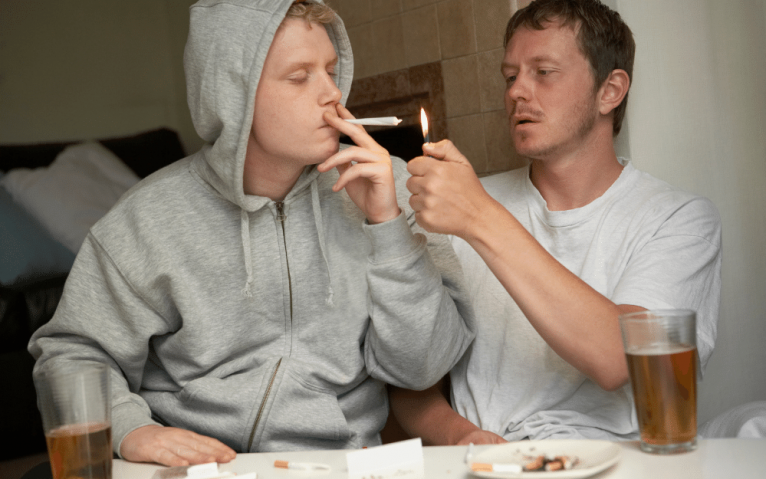Initially, marijuana was seen as a medicinal plant. Later, it became illegal. Today, over thirty states have laws that allow for recreational and medicinal use of marijuana. However, with liberties sometimes come consequences. Many regular marijuana users are now wondering if their habits have gone too far. So, how to know if you’re addicted to weed? Keep reading to learn about the signs of addiction and how to recognize them.
The Truth About Marijuana Addiction
While rare, marijuana use disorder happens to at least 30% of people who use marijuana. This number can be higher among those who start using marijuana products under the age of 18. They are four to seven times more likely to develop marijuana addiction than those who start using as adults.
Marijuana Dependence vs. Addiction
Like other addictive drugs, marijuana has mind-altering compounds responsible for giving users a “high” or euphoric feeling after smoking marijuana. However, dependence on marijuana and addiction to marijuana isn’t that different from each other. According to the Diagnostic and Statistical Manual of Mental Disorders, Fifth Edition (DSM-5), cannabis use disorder is very much a known condition with diagnostic criteria to consider.
How to Know If You’re Addicted to Weed
Regardless of why you use marijuana, there’s a way of telling if you’re addicted to weed. Because “cannabis use disorder” exists in the DSM-5, basically someone has to experience at least two of the following symptoms within a period of 12 months:
- Continuing to use marijuana when it’s causing problems for you
- Craving marijuana.
- Developing a tolerance for it
- Experiencing withdrawal symptoms when you stop using
- Giving up on enjoyable activities because you’d instead use marijuana
- Using larger amounts of marijuana and over a larger period that initially intended without noticing
- Using marijuana in situations that could be dangerous
- Missing important things because you were so intoxicated
- Spending a lot of time seeking and using the drug to recover from its effects
- Thinking about cutting back on your marijuana use without success
[interact id=”5fb5406c9f22c80016e097f0″ type=”quiz” w=”1080″ h=”800″]
Recognizing Signs of Marijuana Addiction
One of the hurdles of recognizing marijuana addiction is that most people are what we know as “high-functioning addicts.” This means that they go to work, school, attend to their families, and function as non-addict people. Because of this, family members and friends often don’t realize their loved one has an addiction until it’s a significant problem. Even still, here are some signs that your loved one can be struggling with marijuana addiction:
- Irritability
- Defensive when confronted about marijuana use
- Completes denies or even claims marijuana addiction isn’t possible
- Feels the need to take a break from family time or work to use marijuana
- Complaints about not feeling right when not using the drug
- Cannot stop talking about how good the drug makes them feel
Getting Help
Believe it or not, marijuana addiction can bring many health consequences. Although marijuana can have plenty of medicinal effects, it can also cause harm. The long-term effects of marijuana abuse remain unknown. Nonetheless, research shows that marijuana can lead to cognitive impairments and structural changes in the brain. Other studies believe that marijuana use among adolescents reduces the volume of specific brain regions responsible for functions like memory, learning, and impulse control. Not to mention, there’s a connection to increased risk of mental health disorders like depression, anxiety, and schizophrenia.
For Yourself
If you believe you’re struggling with marijuana addiction and can’t seem to stop on your own, it might be time to seek professional help. Discuss your symptoms with your primary care doctor. They may be able to refer you to a treatment center. Consider options like talking to a therapist, who can help you understand the root of your addiction. If this feels like too much at the moment, consult with a supportive friend or family member who can help you find the help you need.
For a Loved One
It can be tempting to call out someone on their substance abuse problems. However, that won’t ever do any good. Instead, come from a place of support and understanding. Ask them how they are doing, see if they need any help. If you don’t see any progress towards getting treatment, consider staging an intervention. Use this intervention guide to get started.
Finding Marijuana Addiction Treatment Near Me
Yes, people do go to rehab for marijuana addiction. While many try to quit on their own, they’ll likely replace marijuana with other substances like alcohol, for example. Instead, looking for an addiction treatment center that will treat marijuana use disorder at the source is usually the best option. These programs will incorporate different treatment services, including:
Medical Detox: In this clinically supervised detox process at the rehab center, we ensure the patient’s safety and make the withdrawal phase as comfortable as possible by minimizing withdrawal symptoms and using medication-assisted treatment services to guarantee a complete detoxification process.
Intensive Outpatient Programs: When patients are looking to seek addiction treatment while maintaining daily obligations like work, school, or caregiving, IOPs are a more flexible option that still gives people access to the help they need.
Group Therapy: Recovering addicts need to build a healthy support system that encourages their recovery and sobriety. Group therapy gives them a safe space to foster these relationships and continue working through their recovery after leaving inpatient treatment programs.
Long-term Recovery Programs: With long-term recovery assistance, patients can have the ongoing support they need to maintain long-lasting sobriety. Recovery programs are crucial to relapse prevention.
We offer unique and personalized treatment plans because we believe no two addictions are alike. The journey towards recovery is a long one, but together and with your family and friends’ support, we’ll make it. Whether you or a loved one is thinking about starting addiction treatment, don’t delay it. Start your addiction treatment journey today.









